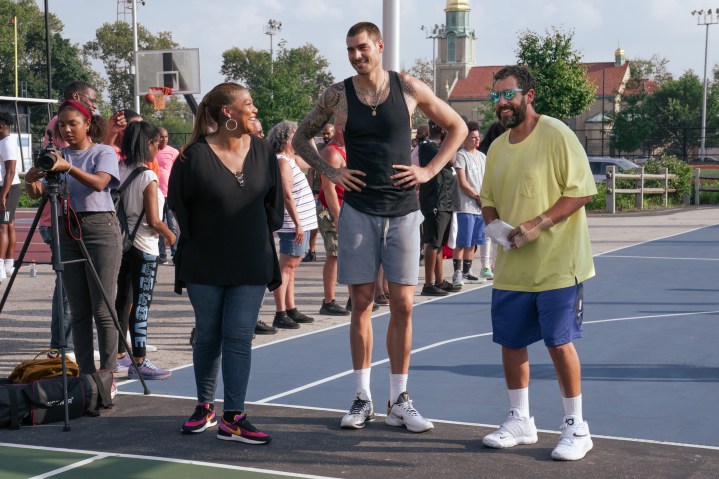In 2019, Adam Sandler proved he still has what it takes to be one of Hollywood’s most versatile and charismatic performers with his performance in the Safdie Brothers’ adrenaline-fueled Uncut Gems. Not since 2002’s Punch-Drunk Love had Sandler played a character so different from his usual goofball archetype, and he earned some well-deserved acclaim for his turn as the film’s self-destructive lead. But Uncut Gems did more than just reaffirm Sandler’s status as a more versatile leading man than his filmography would have you believe.
The film also offered the promise of being the first entry in a new chapter in Sandler’s career, one featuring more variety and legitimately dramatic stories from the Happy Gilmore star than viewers had seen in previous years. While it remains to be seen if that’s the direction Sandler’s career will ultimately take in the coming years, Hustle certainly seems to suggest that it might be.
The new film is the latest production between Sandler and Netflix, but unlike many of the other titles that the two parties’ collaboration has produced, Hustle is a decidedly straightforward drama. Sandler anchors the underdog sports film with one of his most grounded everyman performances to date, and while Hustle doesn’t do anything that one could qualify as game-changing, it still manages to land enough of its shots to walk away victorious.
Once upon a time in Spain…

Directed by Jeremiah Zagar, Hustle follows Stanley Sugarman (Sandler), a man with a complicated past who has spent the majority of his adulthood working as a basketball scout for the Philadelphia 76ers. When he grows tired of waiting for the team’s arrogant owner, Vince Merrick (Ben Foster), to give him the promotion he’s earned, Stanley takes matters into his own hands by recruiting a Spanish basketball player named Bo Cruz (real-life basketball player Juancho Hernangómez), whom he discovers during a business trip abroad.
Stanley firmly believes Bo has what it takes to be one of the NBA’s top players. However, he and Bo quickly realize that, if they want to achieve their respective dreams, that means they’ll have to work together to make it in a league that seems determined to keep them both out of it. Their struggle to succeed takes many turns along the way that will be predictable to anyone who has seen a handful of other sports movies, but the relationship between Sandler and Hernangómez is authentic enough to make the clichéd nature of their bond less damaging than it might otherwise be.
The same can be said for Hustle as a whole. Taylor Materne and Will Fetters’ script for the film delivers all of the beats that viewers will likely want it to, including a lengthy training montage and several rousing, motivational speeches, and the movie never seems remotely interested in subverting viewers’ expectations or turning certain clichés on their head. The film is, instead, totally comfortable telling a familiar story, and while that prevents it from becoming one of the genre’s Hall of Fame titles, it doesn’t stop it from making a tangible mark.
An uphill battle

That’s because Hustle always makes sure to put its characters at the very center of its story, and it invests in them completely from its first scene to its last. That’s especially true for Stanley, whom Sandler brings to life with an understated performance that feels reminiscent of his turn in 2017’s The Meyerowitz Stories. However, it’s a testament to Sandler’s presence as a performer that he manages to maintain Stanley’s restrained nature without ever tamping down his own charisma or likability.
The older he gets, the more Sandler seems to resemble the kind of American character actors that were prolific in the 1970s and 80s, and Hustle puts his increasingly rugged appearance to good use. Opposite him, Hernangómez brings real heart and pathos to Bo Cruz, a talented and hardworking player whose love for his family emerges as both his greatest strength and biggest weakness. As Teresa, Stanley’s wife, Queen Latifah also turns in a reliably charismatic performance in an underwritten role. There’s enough chemistry present between her and Sandler that it’s hard not to wonder why it took so long for them to play a couple on-screen.
While his direction occasionally veers more into music video territory than it should, Jeremiah Zagar often succeeds at keeping Hustle’s visual focus on its characters. The film’s sports sequences aren’t anything to write home about, which may come as a disappointment to viewers, but Zagar’s grounded, intimate visual style makes up for the lackluster nature of Hustle’s basketball set pieces.
Never back down

There’s an earnestness to Zagar’s direction that helps imbue Hustle with a lot of heart, and it’s clear that he’s not the only one involved in the film who felt passionate about getting it right. Sandler is, famously, a big basketball fan in real life, and his desire to deliver a solid and entertaining sports film is apparent in every frame of Hustle. Although there are moments when the film’s script goes a little off the rails and edges into overly saccharine territory, Hustle nearly always manages to right itself.
Ultimately, the film is a well-made piece of crowd-pleasing entertainment, one that boasts several memorable performances from its lineup of capable actors. That said, it’s the earnestness running through Hustle that makes it land as well as it does. That’s because, as Stanley tells Bo at one point in Hustle’s second act, there’s no use in pursuing something if you’re not passionate about it. Fortunately, when it comes to Hustle, there’s plenty of passion and heart to go around.
Hustle premieres Wednesday, June 8 on Netflix.



